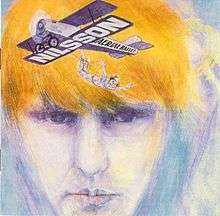Aerial Ballet
| Aerial Ballet | ||||
|---|---|---|---|---|
 | ||||
| Studio album by Nilsson | ||||
| Released | July 1968 | |||
| Recorded | Late 1967–early 1968 | |||
| Genre | Pop | |||
| Length | 25:15 | |||
| Label | RCA Victor | |||
| Producer | Rick Jarrard | |||
| Nilsson chronology | ||||
| ||||
| Singles from Aerial Ballet | ||||
|
||||
| Professional ratings | |
|---|---|
| Review scores | |
| Source | Rating |
| AllMusic | |
| The Essential Rock Discography | 6/10[2] |
| Rolling Stone | (mixed)[3] |
Aerial Ballet is the third album by Harry Nilsson released in 1968.
Aerial Ballet was Nilsson's second album for RCA Victor, and was titled after the highwire circus act of his grandparents. It consists almost entirely of songs written by him, including "One", which later became a Number Five hit for Three Dog Night. (The song's opening line, "One is the loneliest number", is a common phrase to this day, but very few people know who coined it.) The title of the album has been given by Joey Kramer as the inspiration for Aerosmith's name and wings motif.
The most familiar track from Aerial Ballet is its one cover song, Fred Neil's "Everybody's Talkin'". It was released as a single in North America in 1968, and reached the top forty in Canada—but initially flopped in the US. However, the song was subsequently selected for use in the Oscar-winning film Midnight Cowboy and became one of Nilsson's biggest hits as a performer, hitting the US top ten in 1969. Another song, "Little Cowboy", later featured in The Courtship of Eddie's Father, was written by Nilsson's mother.
The original opening number for Aerial Ballet was "Daddy's Song", but this track was removed (apparently without Nilsson's awareness) after the first copies were issued, because The Monkees had recorded a cover version to be featured in their film Head, and had paid $35,000 for exclusive rights to the song. The CD reissue restores "Daddy's Song" (with the Monkees' contract long expired) to its rightful place in the lineup.
When Nilsson visited the Beatles in London during 1968, John Lennon played Nilsson "Revolution" and selections from the (then-upcoming) 'White Album', and Nilsson in turn played to Lennon (who had spent thirty-six hours listening to Nilsson's previous album, Pandemonium Shadow Show) a demo cut of this record.
Track listing
- "Daddy's Song" (Nilsson) – 2:19
- About Nilsson's own experience, as a child of divorced parents. The Monkees recorded a version of the song during 1968 for the soundtrack to their film Head, and, as a result, it was deleted from the album after the first pressing of the album. It was returned to the lineup for the CD reissue.[4]
- "Good Old Desk" (Nilsson) – 2:22
- Guest-starring on Playboy After Dark, Nilsson told host Hugh Hefner the song was really about its initials... "G-O-D". Even though Nilsson later admitted that he was just joking around, it is still commonly believed that the song actually is about God.
- "Don't Leave Me" (Nilsson) – 2:18
- "Mr. Richland's Favorite Song" (Nilsson) – 2:12
- A rags-to-riches story of a pop singer. Mr. Richland worked in music publishing, and liked this song best of the album selection.
- "Little Cowboy" (Nilsson) – 1:20
- A lullaby by Nilsson's own mother, as he sings in the intro.
- "Together" (Nilsson) – 2:08
- "Everybody's Talkin'" (Fred Neil) – 2:41
- "I Said Goodbye to Me" (Nilsson) – 2:13
- A veiled song about suicide.
- "Little Cowboy" – reprise (Nilsson) – 0:49
- "Mr. Tinker" (Nilsson) – 2:41
- "One" (Nilsson) – 2:50
- Possibly the most covered original song of his entire catalogue, "One" is a fairly straightforward song about loneliness and the desperation it brings. Three Dog Night covered it in 1969 with a completely different arrangement, bringing it to #5 on the chart[5] – the arrangement being used for John Farnham's version, also recorded in 1969. Aimee Mann and Jon Brion covered it again in 1994 as an homage to Nilsson's original and the Three Dog Night version for the tribute album "Everyone Sings Harry". A further rearranged version was recorded by Richard Patrick's Filter in 1998 for the X-Files film soundtrack. Progressive Metal band Mastodon recently recorded a version for the video game Army of Two advertisement campaign. The song and ad can be found on YouTube.The Three Dog Night version is also found in the animated Disney movie Recess: School's Out.
- "The Wailing of the Willow" (Nilsson/Ian Freebairn-Smith) – 1:57
- Nilsson was teamed with a co-writer.
- "Bath" (Nilsson) – 1:44
- An innocent-sounding song, about coming home from an overnight visit to a brothel.
References
- ↑ Stephen Thomas Erlewine. "Aerial Ballet – Harry Nilsson | Songs, Reviews, Credits, Awards". AllMusic. Retrieved 2014-03-25.
- ↑ Strong, Martin C. (2006). The Essential Rock Discography. Edinburgh, UK: Canongate. p. 758. ISBN 978-1-84195-827-9.
- ↑ Hansen, Barret (14 September 1968). "Records". Rolling Stone. San Francisco: Rolling Stone.
- ↑ Shipton, Alyn "Nilsson: The Life of a Singer/Songwriter", Oxford University Press, 18, July 2013
- ↑ "Three Dog Night - Chart History". Billboard.com. Billboard. Retrieved 15 September 2016.
External links
- Aerial Ballet at The Harry Nilsson Web Pages
- Daddy's Song video with "The Courtship Of Eddie's Father" on YouTube